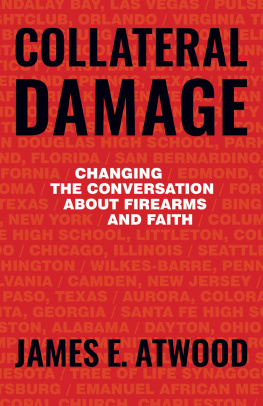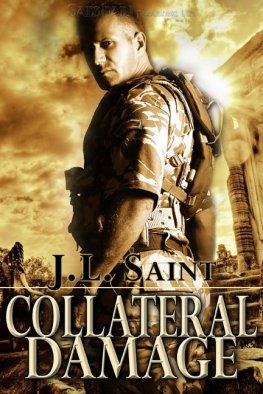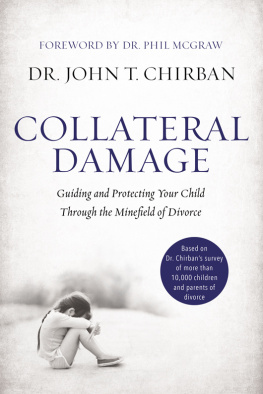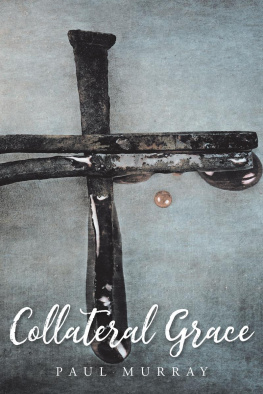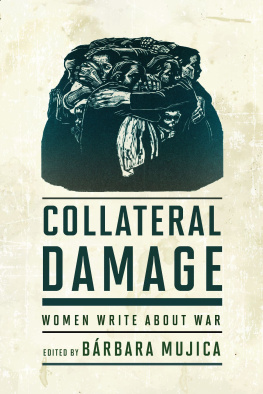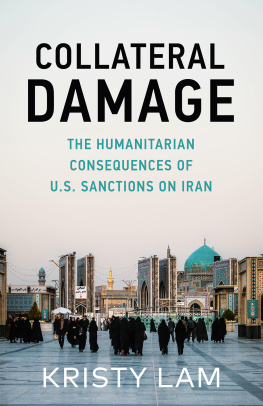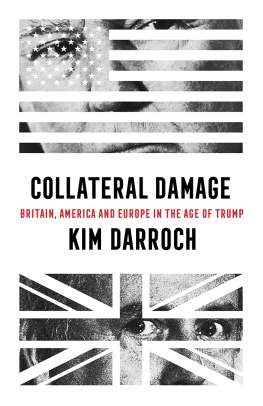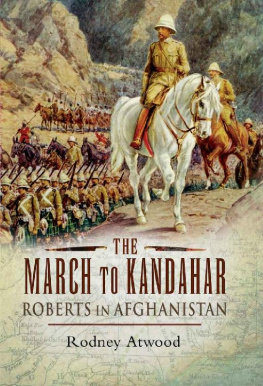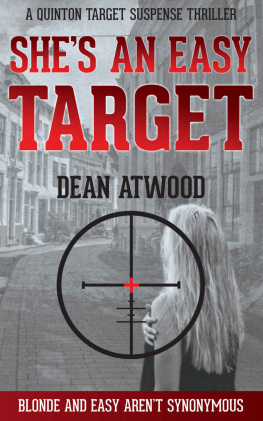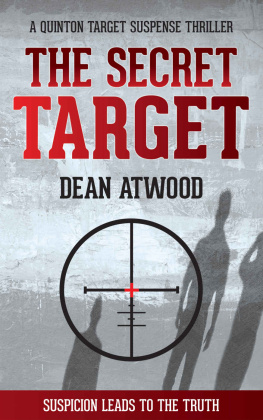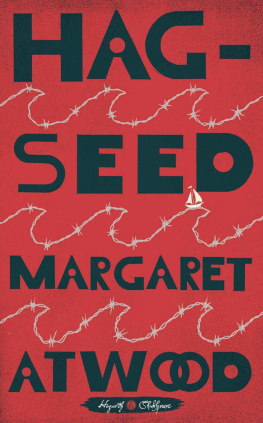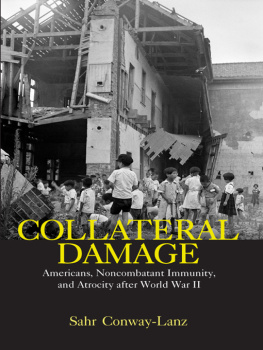Contents

James Atwood has written a faith-based summons to act in hope, to refuse the collusion of despair, and to take faith seriously enough to make a difference. This book is urgent for all those who care about the future of our society and who are ready to act in informed ways.
WALTER BRUEGGEMANN , PROFESSOR EMERITUS AT COLUMBIA THEOLOGICAL SEMINARY
James Atwood knows that we have both a gun problem and a heart problem, and he addresses both. If you care about life, this is required reading.
SHANE CLAIBORNE , ACTIVIST, AUTHOR, AND FOUNDER OF RED LETTER CHRISTIANS
I recommend that congregations who feel hopeless and powerless in confronting gun violence in our society read Collateral Damage together. You will be inspiredand changed.
KATIE DAY , CHARLES A. SCHIEREN PROFESSOR EMERITA OF CHURCH AND SOCIETY AT UNITED LUTHERAN SEMINARY IN PHILADELPHIA
Trust this man and his words. He has researched them well. He has lived them. Then follow his lead and rise up. Peace and justice are Gods work and ours, in collaboration. Together we can, in Atwoods words, work for Gods peaceful tomorrow.
PHIL KNISS , SENIOR PASTOR OF PARK VIEW MENNONITE CHURCH
James Atwood makes a compelling argument that the conversation about firearms is indeed a moral oneand that the status quo is unacceptable. People of faith and all who want to leave a better world for their children should run to read this book.
PETER S. BERG , SENIOR RABBI AT THE TEMPLE IN ATLANTA
Speaking from deep faith and reverence for life, former missionary, pastor, peace activist, and responsible gun owner James Atwood calls all, especially the faithful, to help restore sanity and common-sense safety not only for the sake of the nation but for the sake of the gospel.
AL TIZON , AFFILIATE ASSOCIATE PROFESSOR OF MISSIONAL AND GLOBAL LEADERSHIP AT NORTH PARK UNIVERSITY
As a disaster psychologist, I have seen too often the significant, lasting, and largely overlooked collateral damage of gun violence. With this sobering and ultimately hopeful book, James Atwood shows that the prevalence of gun violence is not just a safety crisis but also a spiritual one.
JAMIE ATEN , BLANCHARD CHAIR OF HUMANITARIAN AND DISASTER LEADERSHIP AT WHEATON COLLEGE
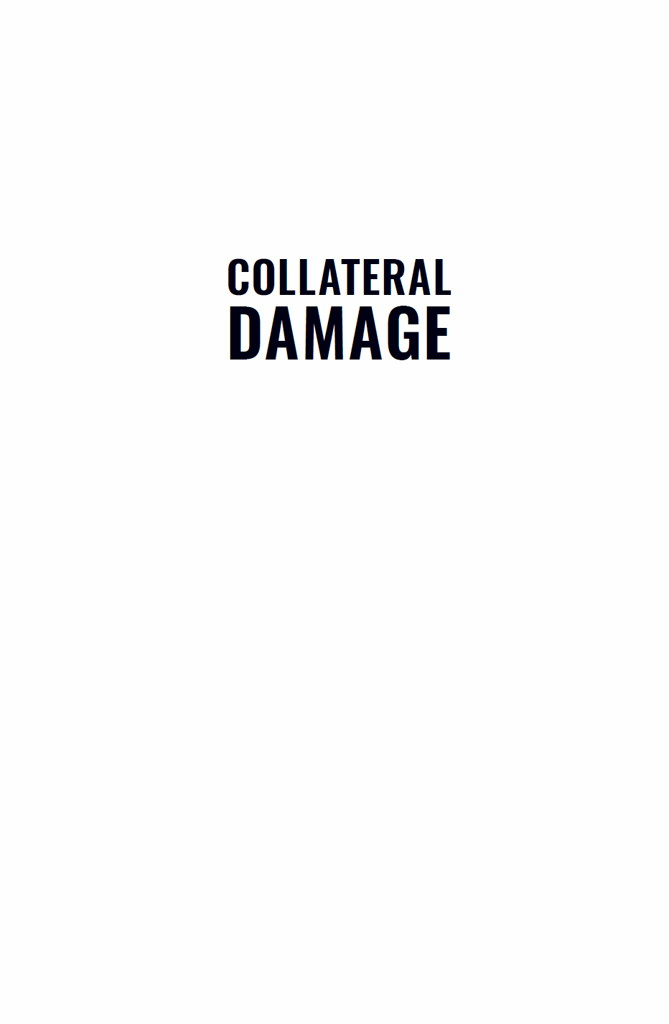

Herald Press
PO Box 866, Harrisonburg, Virginia 22803
www.HeraldPress.com
Library of Congress Cataloging-in-Publication Data
Names: Atwood, James E., author.
Title: Collateral damage : changing the conversation about firearms and faith
/ James E. Atwood.
Description: Harrisonburg : Herald Press, 2019. | Includes bibliographical
references.
Identifiers: LCCN 2019015991| ISBN 9781513804866 (pbk. : alk. paper)
| ISBN 9781513804873 (hardcover : alk. paper)
Subjects: LCSH: United StatesChurch history21st century. | United
StatesSocial conditions. | ViolenceReligious aspectsChristianity. |
FirearmsReligious aspectsChristianity. | FirearmsUnited States.
Classification: LCC BR526 .A89 2019 | DDC 363.330973dc23 LC record
available at https://lccn.loc.gov/2019015991
COLLATERAL DAMAGE
2019 by Herald Press, Harrisonburg, Virginia 22803. 800-245-7894.
All rights reserved.
Library of Congress Control Number: 2019015991
International Standard Book Number: 978-1-5138-0486-6 (paperback);
978-1-5138-0487-3 (hardcover); 978-1-5138-0488-0 (ebook)
Printed in United States of America
Cover and interior design by Merrill Miller
All rights reserved. This publication may not be reproduced, stored in a retrieval system, or transmitted in whole or in part, in any form, by any means, electronic, mechanical, photocopying, recording or otherwise without prior permission of the copyright owners.
Scripture quotations are from the Revised Standard Version of the Bible, copyright 1946, 1952, and 1971 Division of Christian Education of the National Council of the Churches of Christ in the United States of America. Used by permission. All rights reserved.
Scripture quotations marked (NRSV) are from New Revised Standard Version Bible , copyright 1989, Division of Christian Education of the National Council of the Churches of Christ in the United States of America. Used by permission. All rights reserved worldwide.
23 22 21 20 1910 9 8 7 6 5 4 3 2 1
Dedicated to all those who
work for justice and live in hope for
Gods tomorrow
Foreword
W E HAVE A serious crisis in the United States with regard to our valuing of human life. Our nation is a place of extreme violence, leading to nearly forty thousand deaths per year caused primarily by the use of guns. As Jim Atwood writes in these pages, these tragic deaths are just one form of the collateral damage wrought by gun violence. Families suffer. Children are traumatized by school lockdown drills and growing up in neighborhoods plagued by violence. Survivors of gun violence carry physical and psychological wounds. The economic cost of medical care, security measures, and loss of life is staggering.
If this damage were not enough, we lack the will to do anything about this crisis. Gun deaths are so common in the United States that we are numb to the impact of guns on human life. Our newscasts report police shootings, neighborhood murders, school shootings, drive-by shootings, domestic shootings, night club shootings, shootings in houses of worship, suicides by guns, accidental shootings, shootings of children by other children; and the list of the various ways that we have devalued human life in the United States of America continues. It feels as though we have become a nation numb to the pain of a family losing a loved one to gun violence. Gun deaths are a seemingly acceptable norm in our culture. This epidemic is consistent with our obsession with violence and devaluing human life.
During the time I served as the director of the Presbyterian Church (USA) Office of Public Witness (201016), our denomination approved policy intended to provide an advocacy platform to reduce gun violence in the United States. At the time, gun-related deaths were nearly thirty thousand per year. Admittedly, I was shocked at the enormity of this problem, although the news of gun violence even in my local community was at the top of the news hour each morning and evening. Immediately, our office moved to make eradicating gun violence a primary justice advocacy issue. This may have seemed like an overly ambitious goal, but the call to transform a violent culture into a remnant of the peaceable kin-dom is a radical and revolutionary effort.
Collateral Damage does not spare criticism of the National Rifle Association, nor should it. The NRA is a powerful lobby that influences many of the decisions our congressional leaders make with regard to easy access to guns. We witness the influence of this organization through the lens of weak U.S. gun laws. I was stunned to discover that gun lobbies had infused so much money into political campaigns that many of our congressional leaders were bound to support efforts to expand the sale of over-the-counter guns, including assault weapons (which are war weapons). These political contributions serve the gun industry well by securing congressional votes to maintain laws that give easy access to purchasing guns.
As I reflect on the compounded effects of the collateral damage of gun violence, I remember my first workshop on reducing gun violence after our denominational policy was approved. It was eight months after the Sandy Hook Elementary School shooting. I was invited to return to my home state of South Carolina to offer a workshop. Given the congressional stalling and dismissal of this tragic event, it seemed to be a reasonable opportunity to broach the discussion. After all, I was in my home state with friends and colleagues who shared relational connections to my family and collegial relationships that dated back to seminary days.

